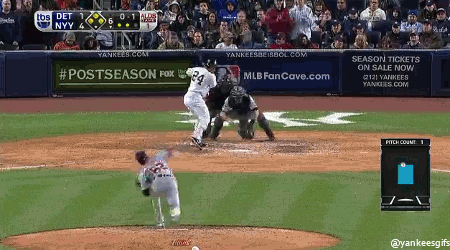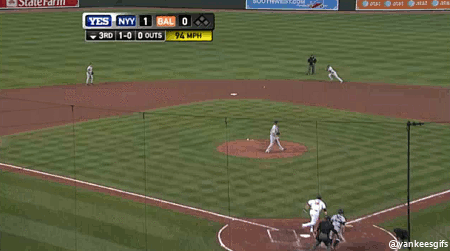
After nine years in the Bronx, five-time All-Star second baseman Robinson Cano returns to Yankee Stadium tomorrow night as an opponent. Life is weird.
On Tuesday night, the baseball world is going to be very weird. A former superstar will return to Yankee Stadium as a visitor after spurning the Yankees of all teams for a big-money contract away from the Bronx. Sure, former players who were let go as free agents like Johnny Damon, Nick Swisher, and Hideki Matsui have returned to this site in the past, but none of them carried the cache that Robinson Cano did during his nine years as a Yankee. The only other legitimate comparison to Cano's return might be when Hall of Famer Reggie Jackson came back to Yankee Stadium as an Angel after George Steinbrenner decided to not pursue him in the 1981-82 off-season. (In his first game back, Reggie promptly homered into the upper deck because that's just what Reggie did.)
However, perhaps that's not even an apt comparison since Reggie didn't come up through the farm system or anything like that. Moving beyond his nine years in New York, Cano spent a full 13 seasons in the organization after being signed as a skinny 18-year-old in January 2001. He was not a well-regarded prospect, never spending any time on Top 100 Prospects lists or anything like that. He just gradually increased his abilities at the plate until he was hitting so well in Triple-A Columbus while Tony Womack looked so awful in early 2005 that the Yankees just had to call him up. Despite struggling a little bit at second base in his first year, Cano had very nice numbers for a rookie with a .297/.320/.458 triple slash, and he finished runner-up in AL Rookie of the Year voting.
In early '05, I was playing my last days of youth baseball in my hometown rec league. For as much as I loved the game, there was no getting around the fact that I was terrible. I couldn't hit anything. The pitches were too fast and some kids were even adding movement. I even frequently missed pitches during batting practice. However, I still enjoyed playing the field at second base, which I had decided a few years prior to be my preferred position. I was a huge Yankees fan and found it curious that while they did have Hall of Famers in Joe Gordon and Tony Lazzeri, there was no player who transcended Yankee history at second base. Thus, it was only logical that when this sweet-swinging second baseman joined the team and found immediate success that he would instantly become my favorite player, usurping the likes of Jason Giambi, Hideki Matsui, and even Derek Jeter. I still have a replica of the #22 pinstriped jersey Cano previously wore before switching to #24 in '07.
When Cano broke out as an All-Star in '06, it was even more exciting. It added legitimacy to some doubts about his sustainability in the majors despite not being much of a prospect. Cano became such a fun player to watch take the field. I always appreciated Jeter and Matsui's efforts, but they always struck me as simply looking too businesslike in their play on the field. While some people prefer that type of play, it can get a little drab. As long as players aren't getting in trouble off the field and aren't shooting their mouths off with dumb quotes, a little flair to the personality never hurt anyone. Cano had flair, and that really started to come out when he emerged as a slugger averaging 28 dingers per year from 2009-13.
For a little while, it seemed like Cano might suffer a similar fate at second base to Alfonso Soriano, who tried very hard at the position from 2001-03 with the team but could just never shed his rock glove. Although Soriano stayed at second for a couple more seasons after being traded to the Rangers, he was ultimately moved to the outfield when he joined the Nationals in '06, where he actually became a pretty good outfielder whose strong arm worked well out there. Like Soriano, Cano had a strong arm, but he otherwise struggled in the infield for most of 2005-09 other than a strong '07.
The '08 campaign was a big struggle in particular as Cano played poorly on both sides of the ball and was benched by Joe Girardi for a game in September. That was probably the lowest point in his young career to date, and when I visited Yankee Stadium in my Cano jersey, I found myself having to defend him from other fans who did not like him. Fortunately for the Yankees and their fans, Cano rebounded at the plate, took a better career path on defense than Soriano, and he became one of the best second baseman in the game. In fact, he played the position so well that "THIS GAME IS EASY" became a meme around Pinstripe Alley because he made incredibly difficult plays look so casual.
Cano was now a superstar and an annual MVP candidate due to his tremendous numbers both on offense and defense. In 2009, he notched a career-high 204 hits with 48 doubles and 25 homers, and the Yankees won the World Series. Cano had the honor of recording the last out on a ground ball by Shane Victorino. From 2010-13, Cano was ridiculously good and played the best baseball ever seen by a Yankees second baseman. He hit .312/.373/.533 with 117 homers, a 142 wRC+, and recorded the second-highest fWAR in all of baseball during that four-year stretch, behind only the otherworldly Miguel Cabrera. Although he struggled in 2012 (when they probably wouldn't have even made the playoffs had he not hit over .600 in the last week of regular season play), he absolutely carried the offense during the 2010 and 2011 playoffs, especially in the 2010 ALCS when he slugged four homers against the Rangers. The Yankees might have been swept without Cano.
Cano stayed amazingly healthy, too. He went on the 15-day DL with a hamstring strain in '06 and never had to return to the DL again. From 2007-2013, he averaged an unbelievable 160 games per year, missing just 14 games overall in seven years, an especially crazy feat considering how many playoff games were typically added to his workload. Yet despite his health, people still nitpicked Cano's style of play since he didn't always hustle down to first base on routine grounders. It's an annoying quibble since Cano not destroying himself on obvious outs likely helped keep him so healthy, and it was also mind-numbing that people complained about it even though he was such an amazingly productive player regardless. Ben Lindbergh put it best in a well-researched article at Deadspin regarding Cano not always "busting it out of the box":
We don't know how much running all out increases a player's injury risk, but if the difference is significant, it makes sense to take it easy. Cano's lone DL stint came when he strained his hamstring while attempting to leg out a double in 2006. Maybe he took that as a warning. If so, it's worked out well: He's played in at least 159 games for seven straight years. (Jeter, of course, has been durable too, though he did strain a calf by running hard to first last season, even after Joe Girardi asked him nicely not to.)
If all we know about a player is that he doesn't sprint to first, it might be fair to wonder about his work ethic. But Long, who's worked with Cano closely, praises his effort in other areas. So, memo to Mariners fans. When you see your new superstar plodding down the line, remember what's at stake: only four singles a season—four singles that could come with a cost in playing time. Then ask yourself this: Would you rather have slow Cano now or risk a lot of Bloomquist later?
It just wasn't relevant enough to really incite such furor from fans, especially when Cano was putting up crazy numbers at the plate anyway. Perhaps it was this mixed reaction from the fans on this topic that led to such ambivalence and even vitriol when Cano ended up signing with the Mariners during the 2013-14 off-season on a monster 10-year, $240 million deal.
Although the Yankees and Cano never seemed close at all on future extension talks following his first extension in February '08, or in his couple months of free agency, it also didn't seem possible that Cano would leave the Yankees. Then suddenly, there was word that the Mariners wanted to make a big splash in free agency, and just a few days later, it was revealed that Cano had signed with the Mariners. Many Yankees fans were bitter that he chased the money, neglecting that the Yankees themselves had plucked homegrown players from other franchises for decades using the same strategy, and that the Mariners offered Cano about 65 million more reasons and two more contract years to join them.
I can't blame Cano. I can't blame the Yankees for not wanting to offer him that contract. It just sucks that tomorrow night, I'll have to deal with seeing my favorite player of all-time suiting up at Yankee Stadium in a Mariners uniform. It's a feeling exactly like other fans have when the Yankees snatch away their favorite homegrown players, and while I had an idea of the difficulties these other fans faced in accepting it, I now truly recognize the overall melancholy.
I'm not able to go to Yankee Stadium tomorrow night, but if I did, I would cheer for him when he first stepped up to bat. The awkward divorce from the team doesn't matter. He gave the Yankees likely the best years of his career and gave fans such joy throughout his tenure in the Bronx, that it makes no sense to me to boo him just because someone offered him a helluva lot more money and that he didn't sometimes didn't hustle on routine grounders or whatever. I miss Robbie, and I will probably always miss Robbie. Yet life moves on, the game continues, and I anxiously await the next Robbie to become my favorite player.

